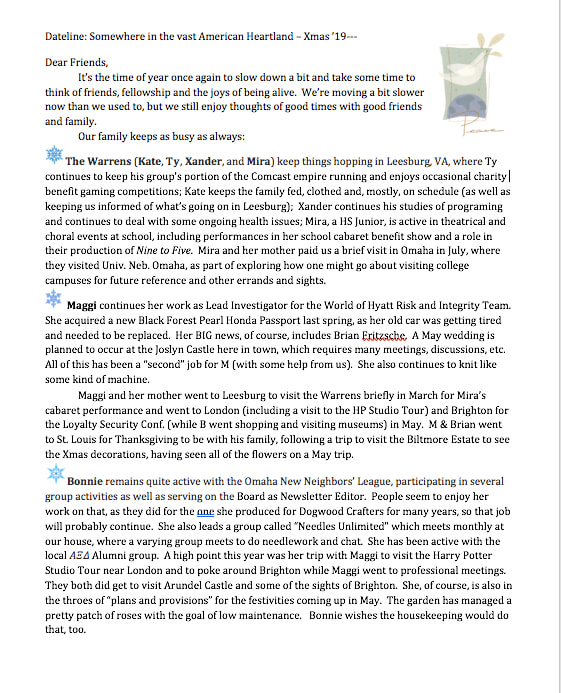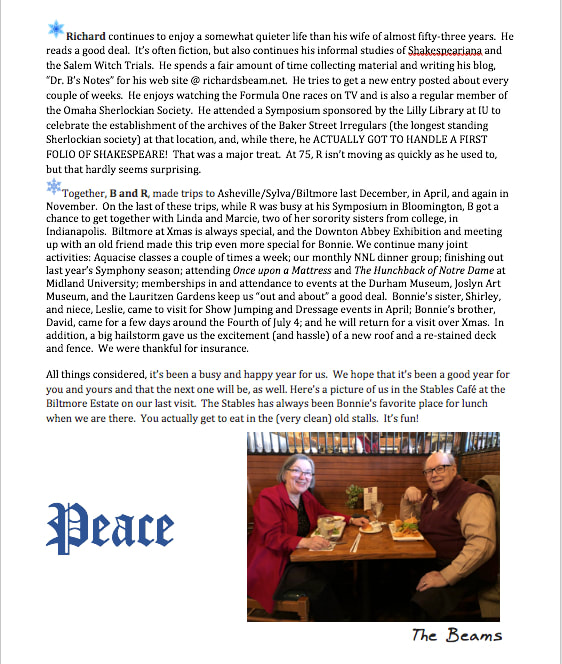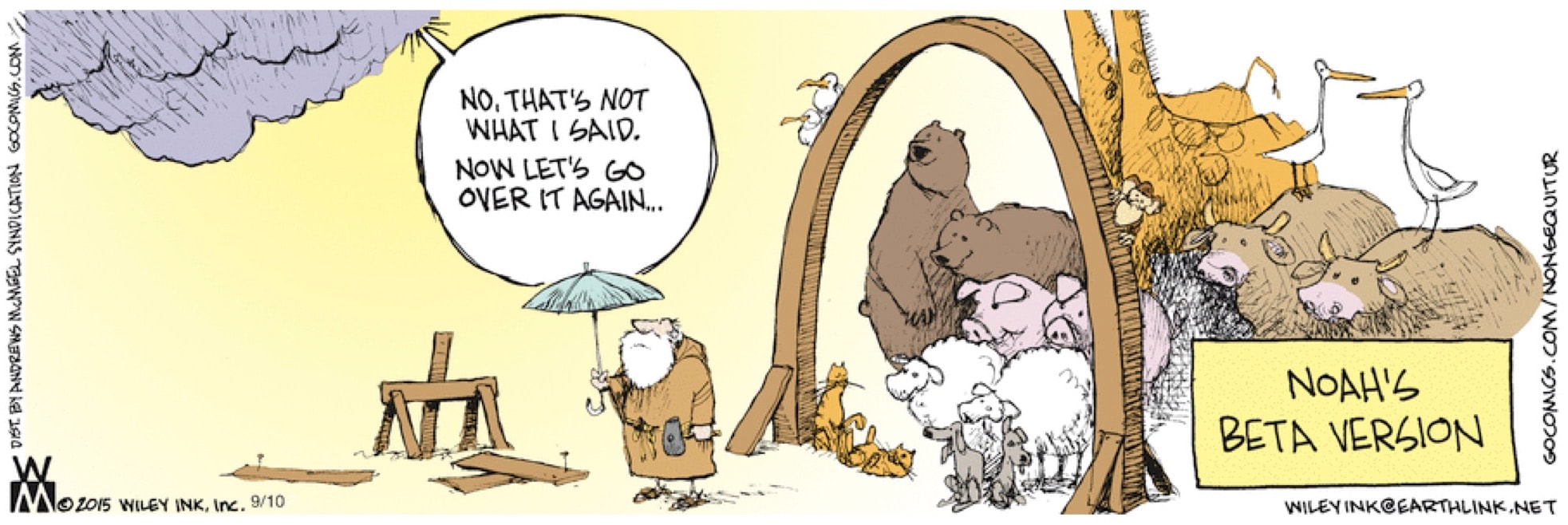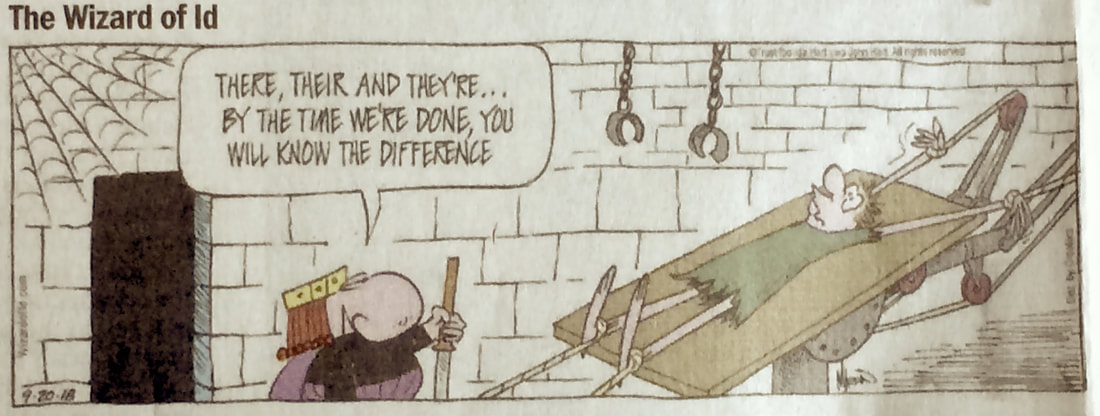|
It’s become my habit to post a copy of the “year-end summary” letter which we enclose with our holiday cards as an entry in this blog about this time of year. There are simply too many people we know (and think of, at least occasionally) to send cards to everyone. Anyway, for those who may remember us from across the years, here’s a summary of what’s been going on with us and our family in the past year. I’ll be back to more of the usual material shortly after the first of the year, but I’m going to take a bit of a break for “family time” at this festive season. As Luann suggests, I hope that in this season of celebration you find the time to have appropriate gatherings with your friends and families. And may there be peace…. LLAP, Dr. B
0 Comments
As many of my former students would probably be happy to attest, one of the things which annoys me the most is the sloppy use of language, be it poor word choice, vague word use, incorrect spelling, inability to distinguish between homonyms, “me/I” substitutions, etc. In fact, I see that I have touched on this sort of thing a number of times before (See numbers 2, 9, 25, 60, 93, 137 and probably others in the archives of this blog.). One of the most egregious violations of good sense in language, it seems to me, is the use of the word “quality.” I sometimes wonder if that word actually is specifically defined, so often is it used to mean seemingly different things. Of course, that’s an exaggeration. It is usually used to suggest that something is good; as in a “quality” education, “quality” leaders, or “quality” products. I find this to be misleading, inaccurate, and incomprehensible. I was taught that the term “quality” did not, necessarily, mean “excellent” but referred to those characteristics which distinguished one thing from another, as in; “This ale has a distinctly different quality from that stout.” (meaning that the taste, mouth feel, etc. are different), or “That cheddar is of a much lower quality than this one.” (referring to the idea that two things can be of the same type, but one is considered superior due to superior ingredients, greater care in processing, or some other factor). But, I ask, what does the term “quality time” mean? Or, “quality coaching,” or “quality schools?” Are we attempting to refer to “HIGH” quality as opposed to “LOW” quality? If not, why not say so. After all, ALL time has a “quality,” although some of it (like getting a cavity filled by the dentist) is likely to be unpleasant, where a different one, like having an outing with friends, is not. I’m told that Albert Einstein once explained his idea of Relativity by suggesting that a minute holding a pretty girl’s hand and a minute with your bare hand on a hot stove were, still, only a minute, but they didn’t seem to be of the same length. I would suggest that they had quite a different quality, in the sense of characteristics. I think words have meanings and that we have to be careful as to what we say, and how we say it. This idea isn’t new to me but, shows up in many ways and places. The specific meaning of a term can, of course, change with the context in which it is used. As my pal, Snoopy, said, on more than one occasion, Yes, I agree that good writing can be difficult, but it can be essential to clarity and accuracy of expression. I suppose that implies that I believe that high quality (good) writing is more acceptable than the other sort. That may be my own peculiar prejudice, but it is something which I believe. I find it hard to accept points of discussion which are poorly expressed and weakly explained. A well-thought-out argument, on the other hand, can have considerable power, even if one, ultimately, disagrees with the conclusion reached. I don’t believe that I am alone in reaching this conclusion regarding the accurate use of language. I suggest that the creators of the “Wizard of Id” comic strip seem to believe that careful use of language can lead to positive responses. For example: One might argue that they just might be a bit too strong in their support for careful use of language, however. In any event, I will confess that I am “picky” about language usage, but the King MAY be going a bit too far (tempting as it may be)! As I have indicated in other places in the archives of this blog, one of the places in which language seems frequently to be quite poorly used is in criticism of all types. Whether it’s wine snobs, art gallery critics, political commentary, or other places; all too often we find ourselves confronted by (often) self-appointed “experts” who seem to feel that it is their right to tell us how we are supposed to react to some work of art, literature, theatre, music, or almost anything else. All too often, the language of “criticism” seems to be, primarily, intended to establish superiority, or to confuse, and obfuscate. See this example from “Luann” Yes, there are works which last for a long time and those which don’t. I’m not at all sure that that really has to do with the work being of a higher standard (higher quality) than other works as it does to lasting commercial appeal, etc. Like most people, I would like to believe that the highest quality work is likely to be the most appreciated, but I’m not at all sure that is, in fact, the case. Apparently, neither does the creator of “Non Sequitur” But I do believe that language matters! It can provide us with many clues regarding the value of the ideas expressed. A high quality of language usage tends to be clear, precise, direct, and to the point. Far too much of what we are exposed to in the media and, especially, in politics, has none of those qualities.
I think that’s too bad, and I hope to see leaders emerge who will give us the respect of paying attention to their use of language. If this doesn’t happen, I’m rather concerned about our, collective, future. LLAP Dr. B |
Just personal comments about things which interest me (and might interest others). Archives
July 2024
Categories |










 RSS Feed
RSS Feed